Top 10 Best Shopify Alternatives in India

The Indian e-commerce environment is dynamic and the companies are looking forward to effective but cheap platforms to have their presence online. Although Shopify continues to be a favorite platform of many businesses worldwide, there is a growing number of Indian entrepreneurs and companies that are considering the available options and are finding alternatives that would be more applicable to their unique needs, financial possibilities, and reflecting on the local market demands. It is a guide to the 10 best Shopify alternatives in India, each of which has its features and benefits.
These options offer powerful features as well as payment gateway integration and customer support and range in price from affordable solutions to enterprise-level platforms. Regardless of whether you are a startup that needs cost-effective solutions or an established business that wants advanced customization features, this guide is going to assist you in making an informed choice. We will as well comment on the revolution of the e-commerce platform by the use of ai tools in shopify alternatives that facilitate easy management of online stores by businesses.
Common Challenges in Running an Online Store
The online store business has many challenges that might affect the growth of business and customer satisfaction:
- Transaction fees: They sometimes eat into profit margins and small companies have a hard time keeping good bottom lines
- Lack of customization: Limit branding and individual user experiences, and compel companies to operate in a narrow set of templates
- Complicated inventory management: It is cumbersome as the businesses grow whereby it will cause stockouts or oversupply problems
- Payment gateway constraints: May lead to lost sales because of transactions failure or unavailability of preferred modes of payment
- Poor mobile optimization: This has an impact on user experience especially given the high number of Indian customers who use mobile devices to shop
- Poor customer support: This may ruin the reputation and customer relations during the peak business hours
What is Shopify, and Why is it So Popular?
What is Shopify?
Shopify is a complete e-commerce solution that allows people and companies to build, design and operate their online shops. It was established in 2006 and has since become one of the most popular e-commerce solutions in the world serving more than a million businesses around the world. It is also a Software-as-a-Service (SaaS) platform, which offers cloud-based infrastructure that is in charge of hosting, security and technical upkeep.
There are plenty of professionally designed themes to select, as well as many payment gateways to integrate, and a huge market of applications and plugins to use. Different types of business supported by Shopify include the dropshipping model, subscription model, and conventional retail. The platform also provides multi-channel selling services so that a business can sell on social media platforms, market places, and their stores. Through its drag-and-drop interface, it is easy to use by less technical users yet offer complex features to developers.
Why is Shopify So Popular?
The popularity of Shopify is explained by a number of important benefits that appeal to companies all over the world:
- Easy to navigate interface: The intuitive Shopify dashboard features a drag-and-drop interface that enables the creation of professional stores without any coding skills.
- Large app ecosystem: Wide marketplace with marketing automation, analytics, and business specific solutions
- Reliability and security: 99.9% uptime ensure merchant confidence and protection of customer data which are PCI DSS compliant
- Scalability options: It can grow a business enterprise level to startup without having to change the platform
- Global abilities: Multi-currency support and international payment allows smooth global growth
- Good community: Excellent documentation and forums, and customer support are widespread
Common Reasons to Switch from Shopify
There are a number of reasons why many businesses turn away Shopify:
- Expensive monthly subscription fees: These may stretch the budgets, particularly of new businesses and small firms that work on narrow margins
- Transaction fees: Incurs extra cost on each sale, which makes a huge difference on profits in the long run
- Lack of design optionality: Limits the freedom and the opportunity to differentiate brands as well as brand identity inside ready-made templates
- App dependency: causes recurring costs and possible problems with compatibility of critical functionality
- Complex pricing structure: Hidden prices do not allow one to forecast the real expenses and budgeting
- Slow customer care response: This may lead to missed business opportunities thus lost revenue during important business times.
How We Chose the Top Shopify Competitors
In selecting the best Shopify alternatives, we had detailed evaluation factors:
- Detailed feature review: At a glance comparison, of the core e-commerce features, product management, payment processing, and customization options of each of the platforms
- Pricing transparency analysis: Analyzing costing, hidden charges and value offers to Indian companies
- Indian market fit evaluation: With an eye on the local payment gateway integration, regional support, and Indian regulations, the evaluation of local market fit is a good idea.
- User experience testing: Practical testing of the setting up and the ease of use of the interface and the general experience of being a merchant
- Customer feedback analysis: Analysis of testimonials, case studies and reviews by real users on the internet
- Scalability and growth potential evaluation: An analysis of how the two platforms will be able to deal with business growth and changing demands
Top 10 Best Shopify Alternatives in India
1. WooCommerce
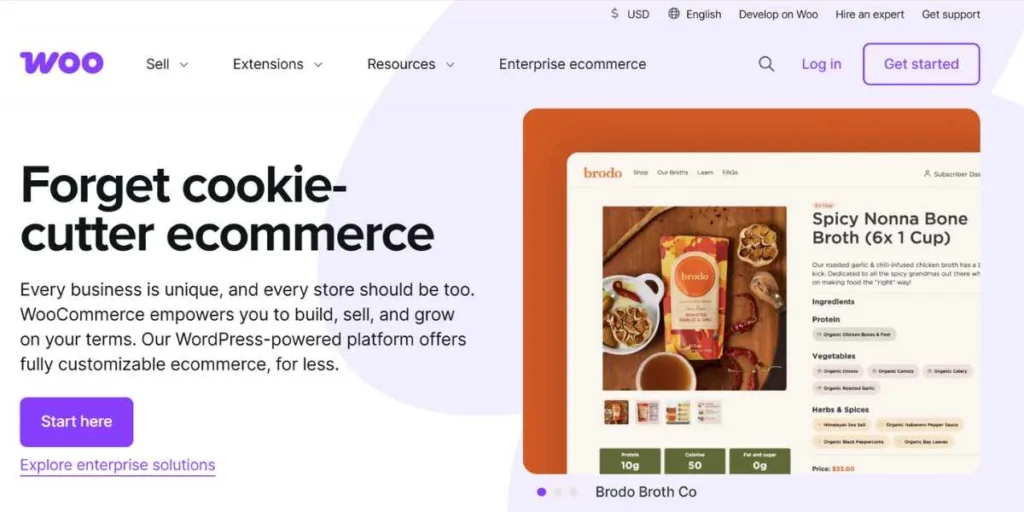
The most popular e-commerce platform in the world is WooCommerce that is used to operate more than 40 % of online stores. It is a WordPress plugin and turns any WordPress site into a complete e-commerce store. The solution offers unmatched flexibility and customization options that are best suited to the business organizations with special requirements. The cheapness of WooCommerce and extensive selection of plugins are particularly popular with Indian companies. It is multilingual and multi currency (it supports all languages except Chinese, Japanese and Korean) and also has a smooth integration with common Indian payment gateways. The fact that it is in search engine optimized format helps companies to appear higher in the search engines and the size of the community implies uninterrupted support and expansion.
Key Features:
- Full WordPress Integration with uninterrupted content management
- Large theme and plugin marketplace thousands of choices
- Powerful product management up to infinite products and versions
- Related business insights with built-in analytics and reporting
- Global reach through multi-currency and multi-language support
Pros:
- Free base platform and paid extensions
- Freedom of unlimited customization with themes and plugins
- Powerful seo with wordpress base
- Huge community support and documentation
Cons:
- Technical knowledge is required to set up and maintain it
- Security and hosting is the user responsibility
- May be costly when using high end plugins and themes
- The poorly optimized setups cause performance problems.
Plans and Pricing:
- Core WooCommerce plugin: Free
- WooCommerce.com hosting: Prices begin at $25/month
- High-end themes: $50 150 one-time
- Mandatory plugins: $50-200/year per plugin
- Hosting fee: $5-50/month varying by provider
Website: https://woocommerce.com
Further Reading: Content Marketplace Platforms in India
2. Squarespace

Squarespace is a hybrid of beautiful design and robust e-commerce features, which is ideal when it comes to creative enterprises and brands that are concerned with appearance. The site has award-winning responsive mobile-friendly and professionally designed templates. The visual-first approach of Squarespace is especially attractive to Indian companies in fashion, art, photography, and lifestyle business. The all-in-one package comes with hosting, security, and customer support eliminating the technicalities. Shopify alternatives such as Squarespace’s design intelligence use AI tools to support the optimization of layouts and content recommendations, enabling non-designers to easily create professional websites.
Key Features:
- Drag-and-drop editing responsive templates award-winning
- Content marketing blogging tool
- Included SEO features and social networks support
- Automation automation and professional email marketing tools
- The full scope of analytics and performance monitoring
Pros:
- Professional, beautiful templates that do not need coding
- Hosting and security included all-in-one solution
- Great customer service and several modes of contact
- Good mobile compatibility of all the templates
Cons:
- Few third party app integration in comparison to competitors
- Reduced Bertal flexibility with e-commerce customization
- Increased costs of premium functions of e-commerce
- Commission rates of lower plans
Plans and Pricing:
- Personal: $16/month (basic web site)
- Business: $23/month (e-commerce ready)
- Basic Commerce: $27 a month (complete e-commerce)
- Advanced Commerce: $49 / month (advanced features)
Website: https://squarespace.com
3. Ecwid
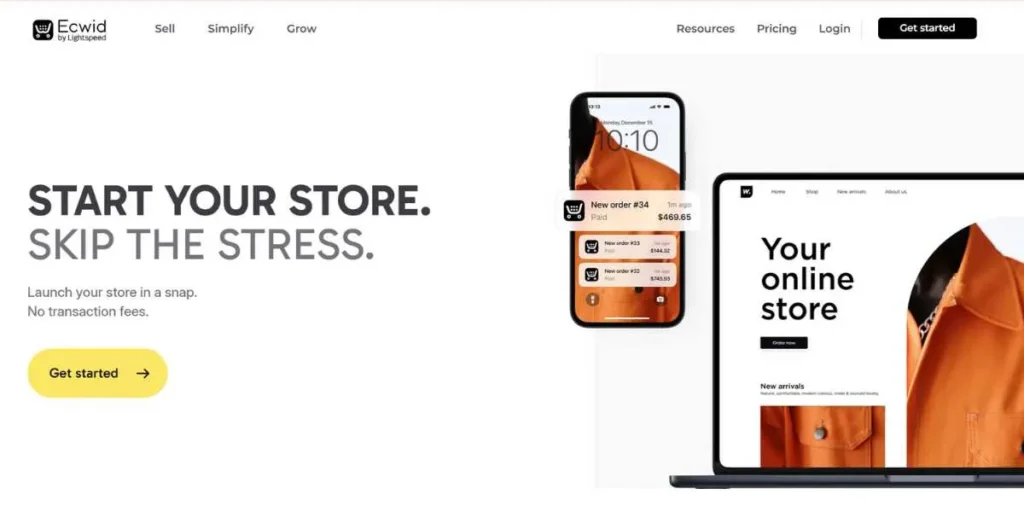
Ecwid is changing the face of e-commerce by enabling companies to build online shops on their current websites, social media profiles, and marketplaces and not have to start over. The platform is multifunctional and supports more than 50 languages and it displays the content automatically across various devices and platforms. Indian enterprises like how Ecwid integrates with their current websites and how it enables them to sell through many channels. Fast load times and trustworthy performance is guaranteed by the cloud-based architecture of the platform. Shopify alternatives integrated through AI tools on Ecwid are useful in streamlining product descriptions, pricing strategies, and inventory management service, thus allowing merchants to have competitive online stores with less effort.
Key Features:
- Compatible with current sites and applications
- Marketplace and social media multi-channel selling
- Native mobile apps and mobile-responsive design
- Mechanical control of the stocks
- Full payment gateway support to Indian markets
Pros:
- Easy to integrate with already existing web sites without redesigning it
- Capable multi-channel platforms
- Free plan that is generous and has necessary features
- Mobile-first strategy and apps
Cons:
- Little freedom in design in relation to standalone platforms
- High-level features need more expensive plans
- Reliance on current web site to gain complete branding
- Limitation in the blogging capabilities of the content marketing
Plans and Pricing:
- Free: 10 products
- Venture: $15/month (max up to 100 products)
- Business: $35/month (up to 2,500 products)
- Unlimited: $99/month (unlimited products)
Website: https://ecwid.com
4. Magento
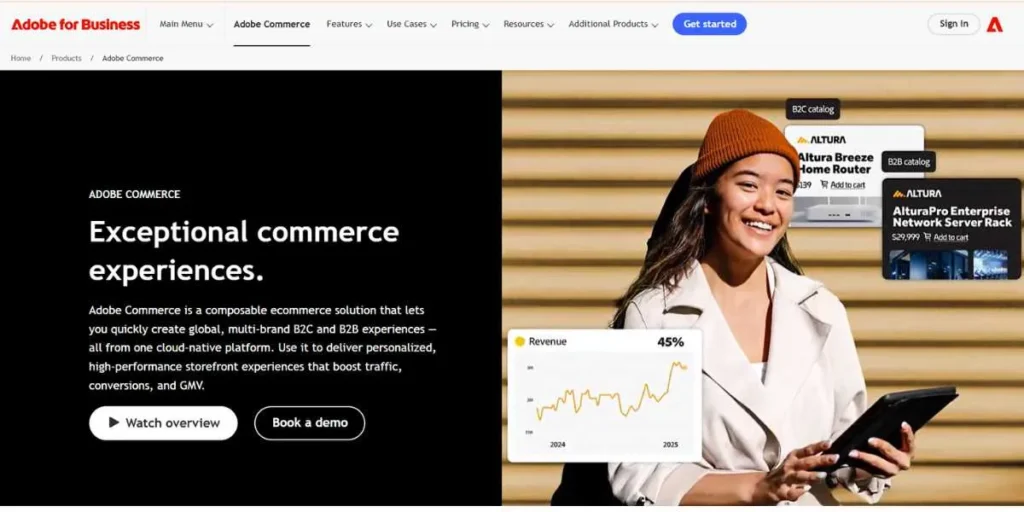
Magento symbolizes the highest levels of e-commerce sophistication with plenty of customization and scalability to massive businesses and complex needs. The open source platform offers high B2B and B2C features, multi-stores and a wide variety of API connectivity. Indian companies and emerging businesses prefer to use Magento because of its rich functionality and performance to process high volume transactions. The platform allows complex inventory management, client segmentation, and automation of marketing. The Magento Commerce is equipped with modern fixtures of ai tools for shopify alternatives such as predictive analytics, personalized recommendations, and automated customer service functions that help improve the shopping experience.
Key Features:
- Elaborated multi-store and multi-website control
- Next-gen B2B customized catalogs
- Wide API compatibility with third party systems
- Premium customer segment and personalization
- Full analytics and reporting dashboard
Pros:
- Very powerful and very versatile for demanding needs
- High B2B ability and price advanced capabilities
- Great optimization of traffic on high performance
- Ecosystem of extensions and developers of large size
Cons:
- Involves high level of technical skills to install and maintain
- Expensive hosting and development prices
- Learning is steep to non-technical users
- The frequently updated version has to be planned and tested
Plans and Pricing:
- Magento Open Source: Free (self-hosted)
- Adobe Commerce: From $22,000/year
- Hosting: enterprise hosting is: $100-$500/month
- Development: custom setup between $5,000 and $50,000+
Website: https://business.adobe.com/products/magento/magento-commerce.html
5. Dukaan
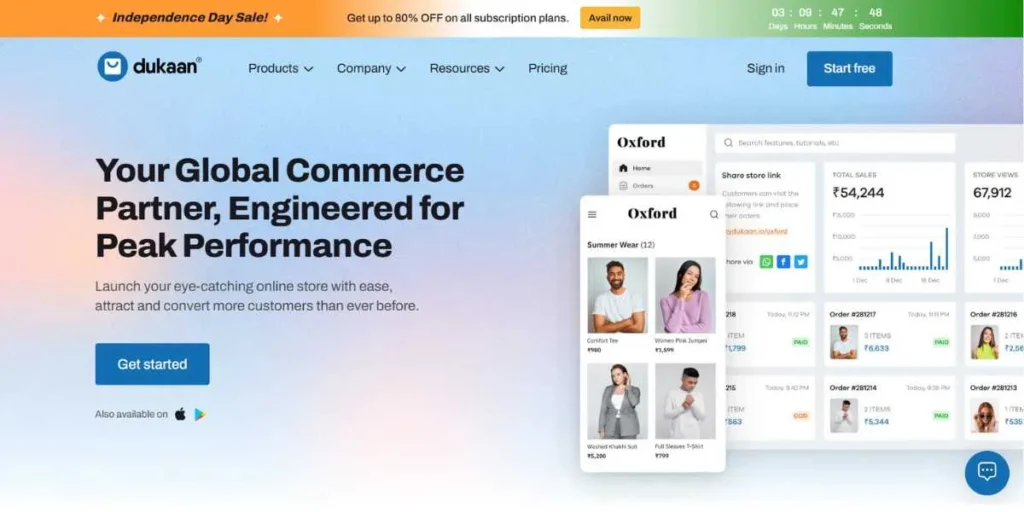
Dukaan now appears as an Indian e-commerce platform that is entirely developed to suit the Indian market and its unique business needs. It is a mobile-first platform where any entrepreneur can make a professional online store in several minutes only with a smartphone. Dukaan knows the local business requirements and provides integration with the most popular Indian payment gateways, logistics, and business tools. The ease of use and low cost of the platform is ideal in small businesses, local retailers and first time venturers in the e-commerce business. Dukaan also has the advanced ai tools for shopify alternatives in the form of automated inventory alerts, sales forecasting, and customer behavior analysis enabling Indian enterprises to compete effectively.
Key Features:
- Mobile-first store setup and rapid setup
- Logistics and Indian payment gateways integration
- Multi-language support of Indian regional languages
- WhatsApp social commerce and social selling
- Indian business management solutions to the entrepreneurs
Pros:
- Made to suit the needs of the Indian market
- Very fast installation with little technical expertise needed
- Low prices that fit small and medium companies
- Good customer services in local languages
Cons:
- Lack of customization on par with global sites
- Less third party integrations and applications
- Reporting and basic analytics
- Low scalability with extremely large businesses
- Limited scalability for very large enterprises
Plans and Pricing:
- Free: Basic store featuring a few features
- Entrepreneur: ₹499/month
- Agency: ₹999/ month
- Enterprise: ₹1999/ month
Website: https://mydukaan.io
6. Shift4Shop

Shift4Shop stands apart by providing an entirely free of charge e-commerce service to businesses that accept payment using their integrated payment processor. This holistic solution offers enterprise level features without monthly subscription, and this is one of the reasons why Indian companies keen on cost will be interested in it. The platform has high-level SEO, marketing automation and customer management functions that you often find in high-level solutions. Shift4Shop is also the best choice among startups and expanding businesses because they have focused on delivering useful tools without any fee. The ai tools offered by the platform to alternatives of shopify encompass smart SEO optimization, smart product suggestions, and smart inventory management tools, which will enable businesses to use their online potential to the fullest.
Key Features:
- Full e-commerce system with no monthly charge
- In-built advanced SEO and digital marketing tools
- All inclusive customer relationship management system
- Selling in multiple channels via different internet stores
- Much customizable themes of professional nature
Pros:
- No subscription charges, no monthly fee whatsoever
- Enterprise features and not enterprise prices
- Good SEO features with in-built optimization functions
- Full functionality with parity with premium services
Cons:
- Free plan needs the payment processor of Shift4Shop to be used
- Few payment gateway avenues of Indian business
- Not as good of a fit to businesses who use local payment solutions
- Less community than more established platforms
Plans and Pricing:
- Basic Store: Free (payment with Shift4Shop)
- And: $29/month
- Pro: $79/ month
- Enterprise: $229/mo
Website: https://shift4shop.com
7. OpenCart
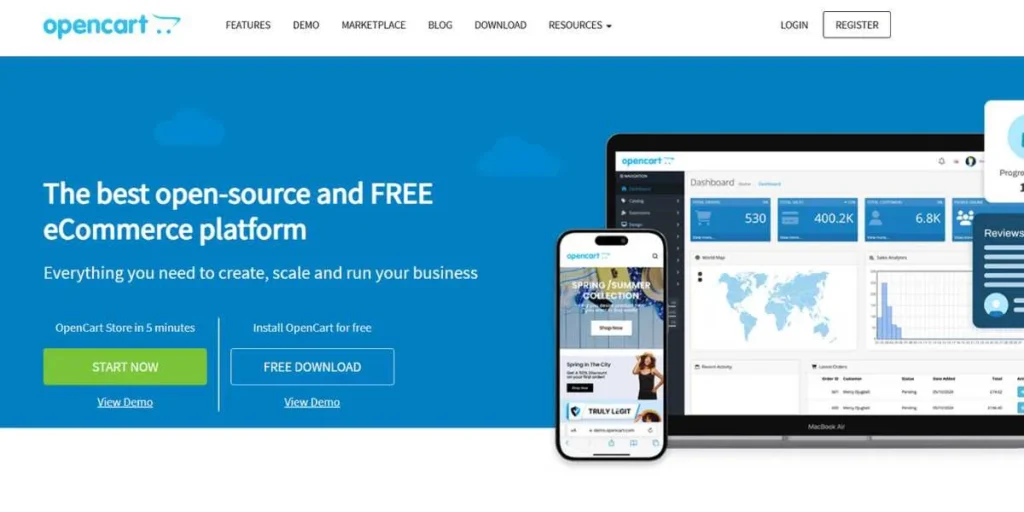
OpenCart is a lean, easy to use open source e-commerce platform that draws a great balance between functionality and simplicity. Small to medium-sized companies find this platform especially appealing because of its easy administration interface and high levels of customization. Indian companies value multi-store and multi-language and multi-currency features of OpenCart. The modular design of the platform enables businesses to expand it by adding features when necessary without inflating the main system. The alternatives of modern ai tools to shopify integrated with open cart are automatic optimization of pricing, observation of customer behavior, smart categorization of products that improve the performance of the store and the experience of the customers.
Key Features:
- Intuitive administration interface with clean interface
- Single dashboard multi-store capability
- Large marketplace of themes and extensions
- In-house affiliate and reward points systems
- Full product management without limitation of categories
Pros:
- No costs to license free open-source platform
- Huge marketplace of cheap themes and extensions
- Easy to operate and a low learning curve
- Good community support and forums
Cons:
- Needs to be customized and updated with technical knowledge
- Fewer marketing tools pre-installed than SaaS platforms
- The user has the security and hosting duties
- There are some advanced features that are paid extensions
Plans and Pricing:
- OpenCart software: Free
- Hosting: $5-50/month by provider
- High-quality themes: $20-$100
- Extensions: $10-50 each
- Professional installation: $500 to $2,000
Website: https://opencart.com
8. Square
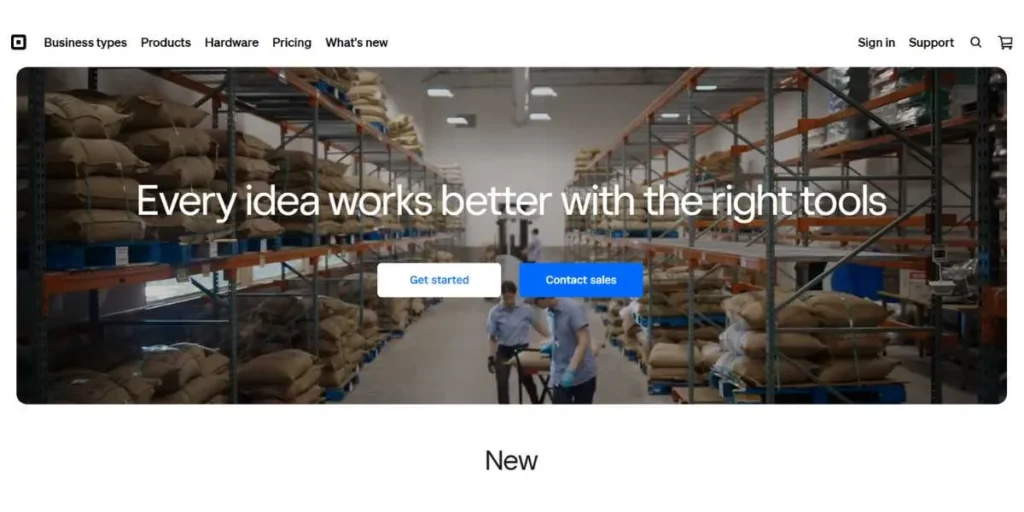
Square transforms business by unifying internet and real world transactions by creating and integrating a complete ecosystem of software and hardware tools. The platform is outstanding in offering coherent inventory controls, customer data and analytics across every sales channel. Square point of sale integration and omnichannel features are beneficial to Indian businesses. The system is powerful because it can align the data across the physical stores and online shops, which gives a real unified commerce experience. The AI tools square provides to its shopify alternatives are predictive inventory management, automated customer insights, and smart payment processing that can enable businesses to optimize their operations across all channels.
Key Features:
- Integration of e-commerce and unified point-of-sale platform
- Inventory synchronization in real-time to all channels
- End-to-end customer relationship tools
- In-built payment processing at competitive rates
- Sophisticated analytics and reporting on all channels of sale
Pros:
- Online to offline integration of sales
- No monthly charges to have basic online store functionality
- All inclusive business management tools were provided
- Good payment processing at clear prices
Cons:
- Small customization possibilities of online stores
- Less design templates than dedicated sites
- Advanced features demand purchases of hardware
- Not as well suited to online-only businesses with no physical presence
Plans and Pricing:
- Free: Square-branded basic online store
- Pro: $12/month (advanced features)
- Performance: $26/month (advanced analytics)
- Premium: $72/month (high level customization)
- Transaction fee: 2.6% and 10% transaction
Website: https://squareup.com
9. Instamojo
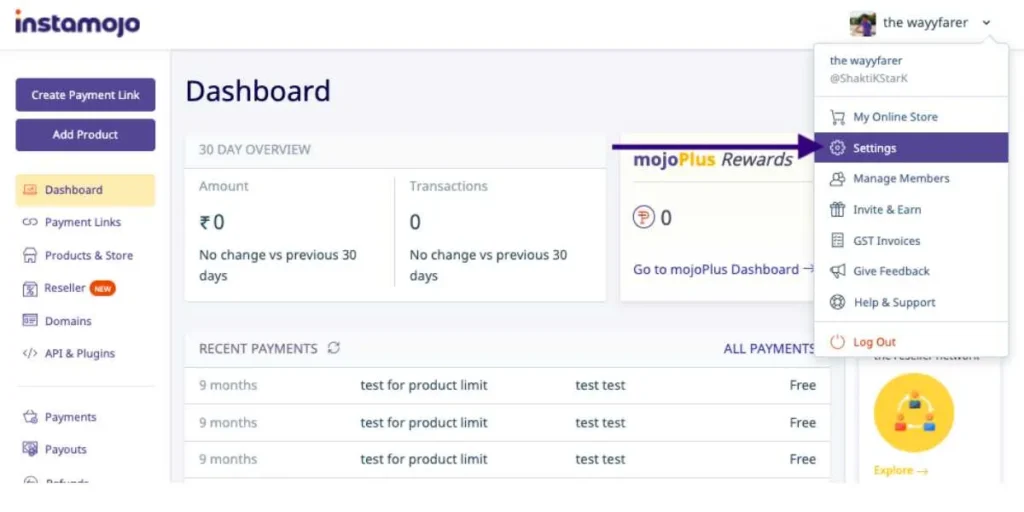
Instamojo is the most popular digital commerce platform in India, and it is especially targeted at Indian entrepreneurs and small businesses. This platform is more than just a regular e-commerce site as it provides digital sales of products, creation of payment links, and a full-fledged business platform adapted to the Indian market. The advantage of Instamojo is that it knows the business culture of India and customer preferences well. The platform can be easily connected with Indian payment gateways and can support diverse business models such as digital downloads to physical products. Advanced shopify alternatives within Instamojo are smart payment routing, automated tax calculations, and intelligent fraud detection, all tailored to the Indian transaction patterns.
Key Features:
- Digital product sales and downloads tools Specialized tools
- Quick generation of instant payment links
- Indian-specific business analytics Enablement
- Digital products multi-format delivery system
- Internal email and SMS marketing automation
Pros:
- Best suited to service-based or digital product sales
- Competitive rates on Indian payment gateway integration
- Easy installation that is non-technical in nature
- Best customer services in local languages and time zones
Cons:
- Less physical product management than complete e-commerce sites
- Less ability to customize the store and brand.
- Simple inventory control of complex product lists
- Few third-party integrations as compared to international sites
Plans and Pricing:
- Starter: Free (free basic features with a limit on transactions)
- Growth: ₹499/month
- Pro: ₹999 a month
- Enterprise: Custom prices
- Transaction fees: 2.5-3.5% Based on plan
Website: https://instamojo.com
10. PinnacleCart
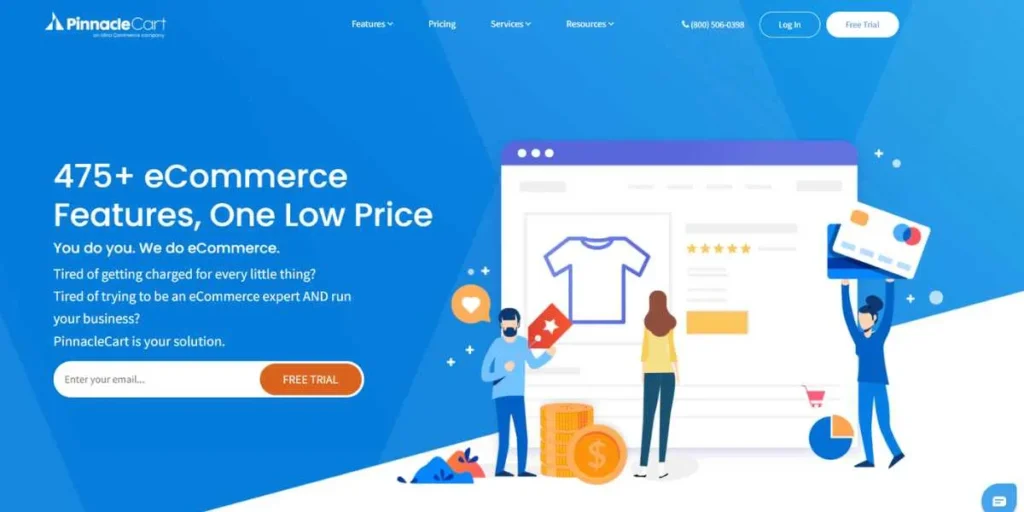
PinnacleCart offers a high-end e-commerce experience that is optimized towards conversion and powerful marketing capabilities. The platform is feature-rich with tools that offer comprehensive solutions to businesses that require an advanced set of online selling features without the complexity of enterprise software. PinnacleCart offers high quality built-in marketing tools, rich SEO features and conversion optimization features enabling businesses to maximize their online revenue. The platform is also in the position to offer the latest features, hence its appropriacy in growing businesses that require advanced features. Shopify alternatives to modern ai tools integrated in PinnacleCart are automated A/B testing, intelligent product recommendations and predictive customer analytics, which stimulate an increase in sales.
Key Features:
- High-level conversion optimization and A/B testing features
- Intensive inbuilt marketing automation and email tools
- Enterprise level security and compliance capabilities
- SEO optimization with auto-generated meta tags
- Marketplaces and social multi-channel integration
Pros:
- Full integrated marketing and conversion tools
- No fees on any pricing plan
- High level of security and PCI compliance
- Great customer care that includes account managers
Cons:
- More expensive than simple e-commerce sites
- More steep to learn because of the complexity of the features
- Less template choices than design-driven services
- Overwhelming to very small businesses with simple needs
Plans and Pricing:
- LAUNCH: $79.95/month
- GROW: $149.95/month
- ENTERPRISE: $329.95/month
- There can be a set up fee based on plan
- No transaction fees at all plans
Website: https://pinnaclecart.com
Explore Related Blog: Order Management Software Tools
Shopify vs Competitors: Side-by-Side Comparison Table
| Platform | Strength | Best For | Ease of Use | Pricing |
| Shopify | All-in-one solution | General e-commerce | Very Easy | $29-$299/month |
| WooCommerce | Customization flexibility | WordPress users | Moderate | Free + hosting |
| Squarespace | Design excellence | Creative businesses | Easy | $16-$49/month |
| Ecwid | Multi-platform integration | Existing websites | Very Easy | Free-$99/month |
| Magento | Enterprise features | Large businesses | Difficult | $22,000+/year |
| Dukaan | Indian market focus | Indian SMEs | Very Easy | ₹499-₹1999/month |
| Shift4Shop | Free comprehensive solution | Budget-conscious businesses | Easy | Free-$229/month |
| OpenCart | Open-source flexibility | Technical users | Moderate | Free + hosting |
| Square | Omnichannel capabilities | Hybrid businesses | Easy | Free-$72/month |
| Instamojo | Digital commerce | Service providers | Easy | ₹499-₹999/month |
| PinnacleCart | Marketing tools | Growth-focused businesses | Moderate | $79.95-$329.95/month |
How to Choose the Right Shopify Alternative for Your Business
Choosing the most appropriate e-commerce platform is not a very easy task to consider several factors:
- Thorough budget analysis: When determining cost of ownership, do not only look at monthly fees but also transaction costs, app costs, and development charges
- Technical expertise considerations: Find out whether you require basic drag and drop or you can manage complex platforms that may require you to have knowledge of codes
- Business model compatibility: Be compatible with the platform in terms of your specific needs in terms of physical products, digital downloads, services, or multi-vendor operations
- Scalability planning: Careful planning should be done with respect to growth expectations and how the platform can support more traffic and larger catalogs
- Integration requirement analysis: Scan the requirements on compatibility with existing business tools, payment gateway, accounting software, and marketing platforms
- Customer support quality evaluation: Take into account availability, responsiveness, and expertise of support teams at critical periods of the business
Final Thoughts: Which Shopify Alternative is Best for You?
The selection of the most appropriate Shopify alternative will eventually depend on your business needs, technical skills, and plans of growth. Businesses that want to understand the local market and require a cost-efficient solution should use Dukaan or Instamojo, and companies that need high customization should use WooCommerce or Magento. Businesses dedicated to visual appeal will be well served by Squarespace, but those that require omnichannel features should look at Square.
The overall inclusion of ai tools in shopify alternatives to all these platforms is making e-commerce more accessible and efficient, and it enables businesses to automate routine work and concentrate on growth. Take into account your budget, technical skills, scalability requirements, and the particular feature requirements that you need when deciding. It is important to keep in mind that the optimal platform is one that scales with your business and offers a great customer experience and performance.
Frequently Asked Questions (FAQs)
Do these Shopify alternatives fit Indian businesses?
Yup, each of the listed options will be able to support Indian payment gateways, to accept multiple currencies, and to offer customer support that will be compatible with Indian time zones. There are platforms tailored to the Indian market such as Dukaan and Instamojo.
What alternative is the most cost-effective to small businesses?
The most cost-effective solution, WooCommerce is free (and the cost of hosting) and Shift4Shop offers comprehensive features with no monthly fee using their payment processor.
Can I transfer my current shopify store to these?
Majority of the platforms have migration tools or services to migrate products, customer data and order history through Shopify. But the complexity is affected by customizations and third-party app integration.
Are these sites multi lingual and multi currency?
Yes, each of the discussed solutions is multi-language and multi-currency, which is why it may be used by companies that aim to provide their services to a wide range of markets and customers across the globe.
What is the most user-friendly platform to start with if I do not have any technical background?
The easiest ones to use are Dukaan, Squarespace, and Ecwid which have an intuitive interface and do not demand much technical expertise to create and maintain.
 Get 50% off on Vault theme. Limited time offer!
Get 50% off on Vault theme. Limited time offer!